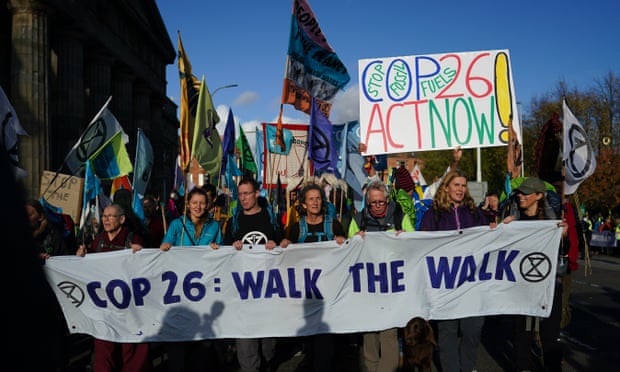COP26 climate summit ‘last, best hope’ to meet 1.5C target says Sharma
By Kelly MacNamara
GLASGOW – Global COP26 climate negotiations are the “last, best hope” to keep the goal of limiting global warming to 1.5C alive, said summit president Alok Sharma as he opened the meeting on Sunday (31).
The Glasgow gathering, which runs to November 12, comes as an accelerating onslaught of extreme weather events across the world underscores the devastating impacts of climate change from 150 years of burning fossil fuels.
“We know that our shared planet is changing for the worse,” said Sharma at the opening ceremony.
Experts warn that only transformative action in the next ten years will help stave off far more cataclysmic impacts.
And the warming of the planet did not pause for the COVID-19 pandemic, which caused the UN meeting to be delayed by a year.
COP26 inherits its central goal from the landmark 2015 Paris Agreement, which saw countries agree to cap global warming at “well below” 2C above pre-industrial levels, and 1.5C if possible.
That deal left many crucial details to be worked out, while emissions reductions remain woefully insufficient to avert global warming.
In August a bombshell “code red” report from the world’s top climate science body warned that Earth’s average temperature will hit the 1.5C threshold around 2030, a decade earlier than projected only three years ago.
And last week a UN report said even the latest, most ambitious carbon cutting commitments would still lead to “catastrophic” warming of 2.7C.
COP26 now marks the “last, best hope to keep 1.5C in reach”, said Sharma.
“If we act now and we act together we can protect our precious planet,” he said.
Much rests on commitment from G20 leaders of richer nations – currently meeting in Rome – whose economies account for about 80 percent of carbon pollution.
They have collectively endorsed the goal of limiting global warming to 1.5 degrees above pre-industrial levels, according to a final draft summit statement obtained by AFP on Sunday.
UN climate chief Patricia Espinosa told the Glasgow opening ceremony that nations must turn away from business as usual or accept that “we are investing in our own extinction”.
More than 120 heads of state and government will make the trip to Glasgow for the UN meeting, including US President Joe Biden, France’s Emmanuel Macron, India’s Narendra Modi and Australia’s Scott Morrison.
But President Xi Jinping of China, the world’s largest emitter, has not left his country during the pandemic and will not be travelling to Glasgow.
Vladimir Putin of Russia, another major polluter, will also be a no-show.
As things stand “there is a serious risk that Glasgow will not deliver,” warned United Nations Secretary-General Antonio Guterres in comments to the G20 on Saturday (30).
“Several recent climate announcements might leave the impression of a rosier picture,” he said.
“Unfortunately, this is an illusion.”
Nations under pressure to reboot their Covid-lashed economies continue to subsidize fossil fuels, even as they tout renewables.
With poorer nations least responsible for greenhouse gas emissions hit hardest by its impacts, inequality overshadows the negotiations.
The failure of rich countries to cough up $100 billion a year starting in 2020 to help developing nations lower emissions and adapt -a pledge first made in 2009 – will complicate the already fraught talks.
– Agence France-Presse


